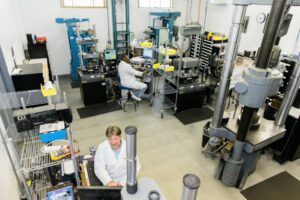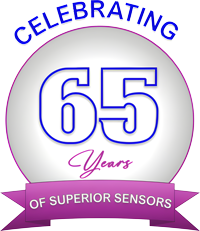Importance of Force Sensor Calibration
A force sensor is an instrument utilized to measure force or weight in various applications. The force sensor is used to convert a force into an electrical signal. Strainsert load cells, load pins, load bolts, load studs and tension links are internal strain gage sensors. This well established technology has been proven for over sixty years.
 Force sensors are used as part of a measurement system because they offer non-intrusive, highly accurate load measurement data. With properly installed and calibrated sensors, accuracies can be achieved of around 0.03 to 1% (depending on type). These systems are critical to many industries including aerospace, marine, mining, oil/gas exploration, military, aviation and automotive. Product liability and safety issues demand that force measurements are demonstrably accurate. Strainsert’s focus on traceability to NIST standards is also a requirement for compliance to ISO and AS certifications.
Force sensors are used as part of a measurement system because they offer non-intrusive, highly accurate load measurement data. With properly installed and calibrated sensors, accuracies can be achieved of around 0.03 to 1% (depending on type). These systems are critical to many industries including aerospace, marine, mining, oil/gas exploration, military, aviation and automotive. Product liability and safety issues demand that force measurements are demonstrably accurate. Strainsert’s focus on traceability to NIST standards is also a requirement for compliance to ISO and AS certifications.
As all force sensors are subject to deterioration due to use, mistreatment, drift or aging, calibration at regular intervals should to be carried out to establish how the load cell is currently performing, irrespective of whether the company has a Quality Management System in place.
Force sensors can also become less reliable due to electrical influence, mechanical effects, instrumentation faults and loose cables. Failure to inspect or clean load cells is another significant factor that can lead to operational issues, as particulate matter can build up around load cells even in clean environments. Unless calibrations are routinely carried out, force measurement readings can become less and less accurate, with the user potentially being unaware that they are using flawed data.
An annual recalibration of the force sensors being used is a well accepted standard. Frequent force sensor recalibration again helps to confirm whether the sensor maintained its accuracy over time. When the sensor is utilized for critical applications and harsh environments, even more frequent calibrations may be required. Please contact Strainsert’s Calibration Team who will assist in evaluating the optimal calibration service schedule for the force sensor.
Any force sensor is vulnerable to errors in measurement. Inaccuracies occur when the output signal deviates from the desired measuring result. When readings are higher or lower than actual, you risk the performance and safety of your application.
Conclusion
The benefits of having a calibrated sensor are clear. Regular calibration is essential to maintain the accuracy and performance of force sensors. It is a step that, if ignored or missed, can lead to problems such as cost overruns, performance issues and loss of accuracy in critical applications.
Please contact Strainsert for a force sensor calibration evaluation and service.

